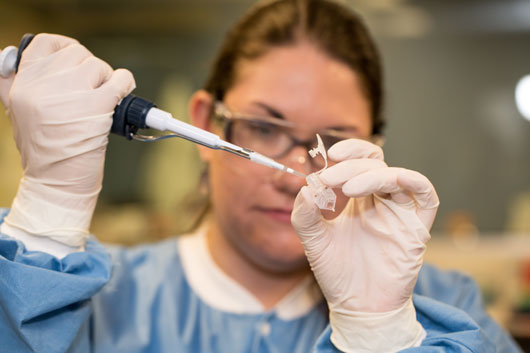
The George Washington University is home to one of the oldest and most prestigious forensic science programs in the country. Located in the heart of the nation’s capital, students are in close proximity to top security centers, federal crime laboratories and investigatory agencies — facilities that provide unique access to forensic science experts and internship/job opportunities.
Program Highlights
- Learn from top practitioners in the fields of law enforcement, including medical examiners, crime scene investigators, lawyers, and computer forensic and information security professionals.
- Gain experience in hands-on, state-of-the-art laboratories with access to digital cameras, forensic instrumentation and computer technology.
- Take advantage of the alumni network and professional connections through internship opportunities in government and the private sector.
- Complete your degree in less than two years; applications are accepted year-round and the program offers convenient afternoon and evening classes.
Program Concentrations
Crime Scene Investigation (M.S.)
CSI is designed for investigators, detectives, lawyers, special agents, medicolegal death investigators, crime scene technicians and students seeking to become forensic pathologists. Students learn techniques used to document crime scenes, such as photography and diagramming, processing evidence at the crime scene, and collecting and packaging evidence properly so it does not incur contamination or biodegradation. Online courses are also available.
Forensic Chemistry (M.F.S.)
Accredited by the Forensic Educational Programs Accreditation Commission, Forensic Chemistry trains students to be lab analysts in the fields of forensic drug chemistry or trace evidence analysis. Drugs and their analyses are presented to students through courses in medicinal chemistry and a special topics course on the analysis of dosage forms of drugs. Mass spectrometers are among the cutting-edge tools used by faculty with their students.
Forensic Molecular Biology (M.F.S.)
Accredited by the Forensic Educational Programs Accreditation Commission, Forensic Molecular Biology prepares students to work in crime labs as DNA analysts and technical leaders. Students train in chemical, physical, immunological and microscopic methods, and the theoretical and practical aspects of advanced methods such as DNA extraction and data interpretation.
Forensic Toxicology (M.F.S.)
Also accredited by the Forensic Educational Programs Accreditation Commission, Forensic Toxicology prepares analysts to work in crime labs, private labs and medical examiner or coroner offices. The program has a close working relationship with the toxicology laboratories of the Metro D.C. Office of the Chief Medical Examiner and the D.C. Pretrial Services Laboratory. Students benefit from new mass spectrometry equipment and learn how to conduct analysis of biological samples, interpret their findings and determine the presence of drugs.
Forensic Investigation (Graduate Certificate)
This 15-credit certificate is designed for professionals working in the forensic sciences community who seek to enhance their credentials and advance their degree.
For more information, visit www.columbian.gwu.edu.




